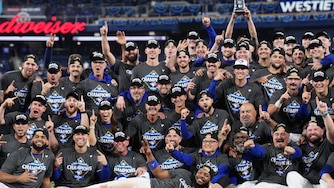Towson University students moved their “No Kings” rally off campus after a school official told them speakers’ names would be run through federal government databases and vetted for security reasons.
The demonstration, one of dozens planned in Maryland on Saturday, will protest policies of President Donald Trump that organizers say are authoritarian. Students moved the event, fearing that speakers would be targeted by the Trump administration, which has threatened to pursue and punish liberal activist groups if their names were shared with federal authorities.
A university official, the students said, told them there were concerns about potential political violence. The exchange between organizers and university administrators unfolded less than a month after the killing of political activist Charlie Kirk on a college campus in Utah.
Members of a Towson student group, the Young Democratic Socialists of America, say administrators have never discussed background checks for speakers at other political rallies they’ve organized, and a Maryland ACLU attorney said such a requirement has an ”obvious chilling effect on speech.” Towson officials, on the other hand, say it’s an established practice for large-scale campus events.
Towson performs background checks on “all events on campus regardless of their content” and campus police run background checks “on all external speakers, entertainers, singers, etc. to determine level of security needed for each event,” according to Jamie Abell, vice president of media relations.
Read More
“The institution takes very seriously its obligations both under the First Amendment and to the priority of public safety,” said Sean Welsh, the university’s senior vice president for communications and chief strategy officer.
University officials did not deny students were told federal background checks would be performed. Welsh said it uses “accessible information through public safety agencies to stay informed.”
The process has “existed in an evolving iteration for years as guided by best practices,” he said.
The event organizers anticipated roughly 2,500 attendees, which officials said rose “above the threshold to initiate such security measures.”
Davis Payton and Noah Glorioso, Towson students who organized the rally, said an administrator responsible for helping them plan the event alluded to concerns speakers could be targeted by “political violence.”
“They said, given the rise of current political violence and the recent assassination, they just want to be aware if there’s any threats against any of the speakers,” Glorioso recalled.
Payton, a co-leader of the Young Democratic Socialists of America, a sanctioned student organization at Towson, said that the administration wanted to know if there was “anyone who might want to hurt people that are coming to speak” at the rally.
Payton, who said he’s planned at least one political rally during each of his seven semesters at the university, said the conversation came as a “surprise.”
When the administrator asked for a list of speakers’ names and addresses, student organizers said they grew uncomfortable.
A top attorney with the Maryland ACLU said requesting the identities and addresses of speakers as a condition of holding an event flies in the face of protections guaranteed by the First Amendment. An academic institution responsible for teaching these principles should “know better,” said David Rocah, senior staff attorney.
Rocah cited decades of Supreme Court decisions which protect the right to speak anonymously.
He said there are plenty of other ways to determine whether an event speaker is controversial or has threats against them, and a background check has “no useful purpose other than to serve as a deterrent.”
The First Amendment protects controversial and noncontroversial speech equally, he said, and prohibits the government from limiting it or putting conditions on it because someone may not like it.
Peaceful, lawful protests and counterprotests are allowed on the Towson campus, according to the university’s website, which says it “supports the rights of university students, faculty and staff to engage in protected speech and assembly, including demonstrations, marches, picketing, leafleting and protesting.”
But like other college campuses around the country, Towson has a strict policy on the time, place and manner of speech that restricts protesting to certain areas on campus.
Ultimately, Payton and Glorioso decided to move the rally off campus to protect the speakers.
“We don’t want to be putting people in harm’s way by passing their names to the university, who would then pass them to the FBI, when we know that the president wants to come after those types of people,” Payton said. “We didn’t want to put them in harm’s way.”
Welsh, the Towson spokesperson, clarified that the university does not run visitors’ names through any Federal Bureau of Investigation background check processes.
The students’ rally, which has been planned in partnership with Baltimore County Indivisible, has been moved to Riderwood Hills Park.
No Kings rallies aimed at opposing Trump and his policies first took place across the country in June. Millions of people attended the thousands of peaceful, nonviolent protests to rail against a Republican chief executive they say is acting like an authoritarian ruler.
This second round has drawn the attention of top GOP leaders in Congress. U.S. House Speaker Mike Johnson, a Republican from Louisiana, has branded them “hate America” rallies.
Baltimore Banner reporter Nori Leybengrub contributed to this story.



Comments
Welcome to The Banner's subscriber-only commenting community. Please review our community guidelines.